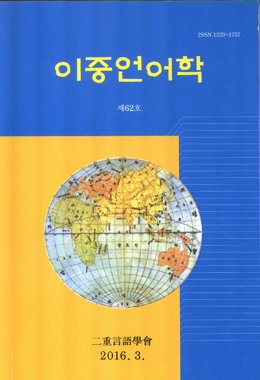This study explored the effects of cross-language transfer on the first language abilities in Korean children who were learning English as an EFL(English as a Foreign Language). It also attempted to test the threshold hypothesis proposed by Cummins(1979). The threshold hypothesis posits that a bilingual child must attain a threshold level of linguistic proficiency in one language in order to make a positive effect on the other language. In this study, thirty six 4- and thirty six 5- year- old Korean children were tested on their English abilities (alphabet recognition, phonological awareness, vocabulary, and sentence comprehension), and then divided into high and low English proficiency groups. They were tested on their Korean language abilities (phonological awareness, vocabulary and sentence comprehension). The children`s non-verbal intelligence was measured by Korean edition of Leiter-R test. The result showed that the age effect was significant; 5-year-old children performed better than 4-year-old children did on Korean phonological awareness task and sentence comprehension task. The English proficiency was also significant; the children in the high English proficiency group performed better that children in the low English proficiency group did on Korean phonological awareness, vocabulary task, and sentence comprehension task. It means that children who were more proficient in English showed more advanced Korean language abilities. These results can be interpreted as evidence which supported the threshold hypothesis (Cummins, 1979). However, the interaction effect of age and English proficiency was also significant in the Korean phoneme deletion task. It means that the English proficiency can facilitate children`s Korean phonemic knowledge in 5-year-old children, but not in 4-year-old children. This interaction implies that the application of threshold hypothesis may vary depending upon the age level.




